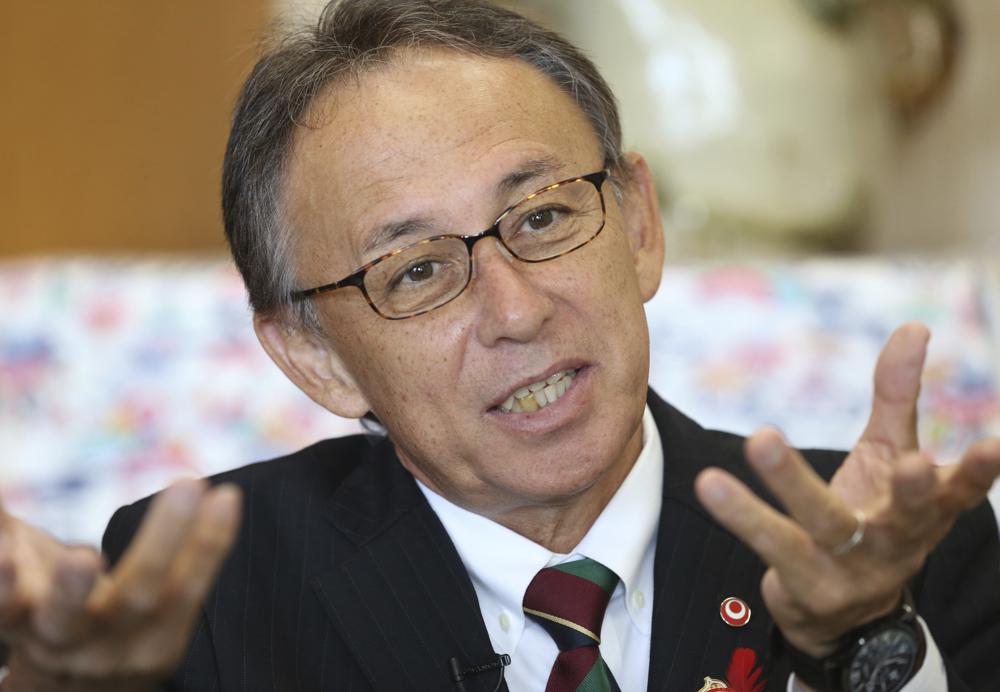

Japan should focus more on peaceful diplomacy with China instead of on military deterrence as tensions rise around Chinese-claimed Taiwan, the governor of the nearby southern Japanese island of Okinawa said Friday. He also urged that the burden on Okinawa of hosting a majority of the American troops in Japan be reduced.
“We are strongly alarmed,” Okinawa Gov. Denny Tamaki said of discussions in parliament about the possibility of a security emergency involving Taiwan, and concerns that Okinawa, 600 kilometers (370 miles) away, could become embroiled in it.
Tamaki was speaking online from the prefectural capital of Naha ahead of the 50th anniversary of Okinawa’s return to Japan on May 15, 1972, 20 years after most of Japan regained independence from the U.S. occupation following World War II.
There is concern in Okinawa, with its continuing heavy U.S. military presence, over rising tensions resulting from China’s increasingly assertive military actions in the region and its rivalry with the United States. There is also worry that the Russian invasion of Ukraine might embolden Beijing.
China claims independently governed Taiwan as its own territory, and controlling the island is a key component of Beijing’s political and military thinking. In October, Chinese leader Xi Jinping reiterated that “reunification of the nation must be realized, and will definitely be realized.”
In what Beijing calls a warning to advocates of Taiwanese independence and their foreign allies, China has been staging threatening military exercises and flying fighter planes near Taiwan’s airspace, including on Feb. 24, the day Russia began its invasion of Ukraine.
“Any escalation of problems over the Taiwan Strait and the contingency of Okinawa being a target of attack must never happen or be allowed to happen,” Tamaki said.
The ongoing tension has rekindled fears among Okinawans that they may be sacrificed again by mainland Japan, as in the Battle of Okinawa that killed some 200,000 people, half of them civilians, near the end of World War II.
Japan views China’s military rise as a regional threat and has been shifting its troops to defend southwestern islands including Okinawa and its outer islands, deploying missile defense systems and other facilities, and increasing joint drills with the U.S. military and other regional partners.
On Friday, Chinese Foreign Ministry spokesperson Zhao Lijian said Japan “has been taking advantage of diplomatic activities to make an issue of China, play up regional tensions and hype the so-called China threat,” and that Tokyo is “looking for excuses for its military expansion.”
The U.S. has consistently expressed support for ensuring that Taiwan can defend itself, and Chinese military action against the island in the short- to medium-term is generally considered a remote possibility.
Noting that China is Japan’s biggest trading partner and that Japan is China’s second largest, Tamaki said their close economic ties are indispensable.
“I call for the Japanese government to always maintain calm and peaceful diplomacy and dialogue to improve its relations with China, while working toward easing U.S.-China tension,” he said.
Okinawa at the time of its reversion asked Japan to make it a peaceful island free of military bases. Today, it still hosts a majority of the approximately 50,000 U.S. troops and their military facilities in Japan, and Tamaki said that burden should be shared by all of Japan.
Because of the U.S. bases, Okinawa faces noise, pollution, aircraft accidents and crime related to American troops on a daily basis, Tamaki said.
“That excessive U.S. base burden is still unresolved 50 years after the reversion,” he said. “Okinawa’s burden of the U.S. military bases is a key diplomatic and security issue that concerns all Japanese people.”
The biggest sticking point between Okinawa and Tokyo is the central government’s insistence that a U.S. Marine base in a crowded neighborhood, Futenma air station, be relocated within Okinawa instead of moving it elsewhere as demanded by many Okinawan people.
While development projects over the past five decades have helped Okinawa’s economy, the average Okinawan’s income remains the lowest among Japan’s 47 prefectures, Tamaki said.
If land taken by the U.S. military is returned to the prefecture for other use, it would produce three times as much income for Okinawa, Tamaki said.